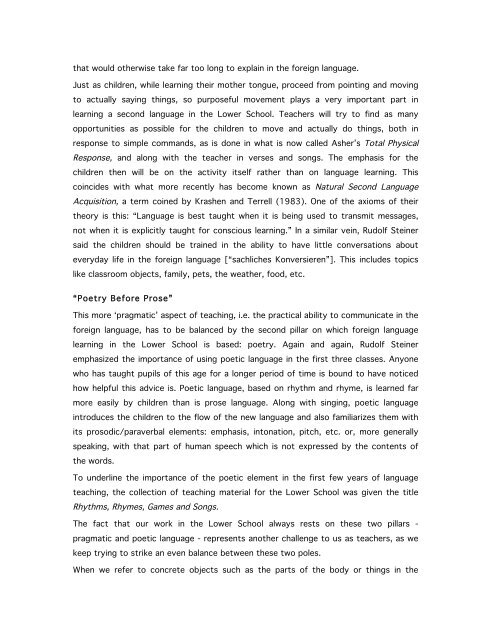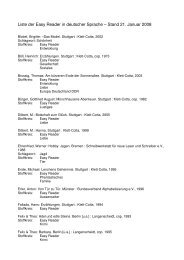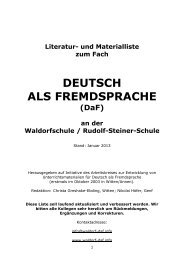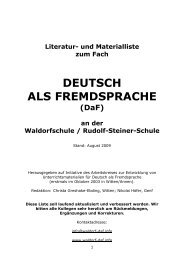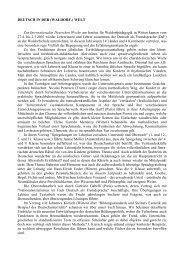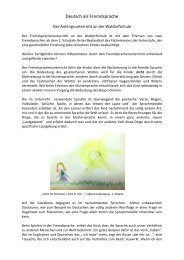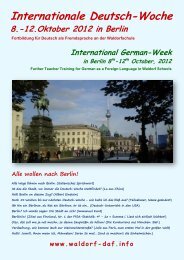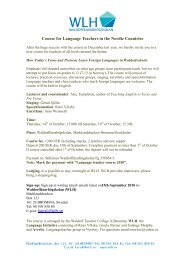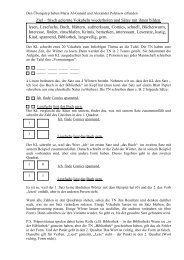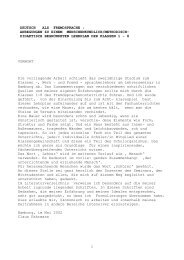Foreign Languages in Steiner Waldorf Education - Waldorf-DaF
Foreign Languages in Steiner Waldorf Education - Waldorf-DaF
Foreign Languages in Steiner Waldorf Education - Waldorf-DaF
You also want an ePaper? Increase the reach of your titles
YUMPU automatically turns print PDFs into web optimized ePapers that Google loves.
that would otherwise take far too long to expla<strong>in</strong> <strong>in</strong> the foreign language.<br />
Just as children, while learn<strong>in</strong>g their mother tongue, proceed from po<strong>in</strong>t<strong>in</strong>g and mov<strong>in</strong>g<br />
to actually say<strong>in</strong>g th<strong>in</strong>gs, so purposeful movement plays a very important part <strong>in</strong><br />
learn<strong>in</strong>g a second language <strong>in</strong> the Lower School. Teachers will try to f<strong>in</strong>d as many<br />
opportunities as possible for the children to move and actually do th<strong>in</strong>gs, both <strong>in</strong><br />
response to simple commands, as is done <strong>in</strong> what is now called Asher’s Total Physical<br />
Response, and along with the teacher <strong>in</strong> verses and songs. The emphasis for the<br />
children then will be on the activity itself rather than on language learn<strong>in</strong>g. This<br />
co<strong>in</strong>cides with what more recently has become known as Natural Second Language<br />
Acquisition, a term co<strong>in</strong>ed by Krashen and Terrell (1983). One of the axioms of their<br />
theory is this: “Language is best taught when it is be<strong>in</strong>g used to transmit messages,<br />
not when it is explicitly taught for conscious learn<strong>in</strong>g.” In a similar ve<strong>in</strong>, Rudolf Ste<strong>in</strong>er<br />
said the children should be tra<strong>in</strong>ed <strong>in</strong> the ability to have little conversations about<br />
everyday life <strong>in</strong> the foreign language [“sachliches Konversieren”]. This <strong>in</strong>cludes topics<br />
like classroom objects, family, pets, the weather, food, etc.<br />
“Poetry Before Prose”<br />
This more ‘pragmatic’ aspect of teach<strong>in</strong>g, i.e. the practical ability to communicate <strong>in</strong> the<br />
foreign language, has to be balanced by the second pillar on which foreign language<br />
learn<strong>in</strong>g <strong>in</strong> the Lower School is based: poetry. Aga<strong>in</strong> and aga<strong>in</strong>, Rudolf Ste<strong>in</strong>er<br />
emphasized the importance of us<strong>in</strong>g poetic language <strong>in</strong> the first three classes. Anyone<br />
who has taught pupils of this age for a longer period of time is bound to have noticed<br />
how helpful this advice is. Poetic language, based on rhythm and rhyme, is learned far<br />
more easily by children than is prose language. Along with s<strong>in</strong>g<strong>in</strong>g, poetic language<br />
<strong>in</strong>troduces the children to the flow of the new language and also familiarizes them with<br />
its prosodic/paraverbal elements: emphasis, <strong>in</strong>tonation, pitch, etc. or, more generally<br />
speak<strong>in</strong>g, with that part of human speech which is not expressed by the contents of<br />
the words.<br />
To underl<strong>in</strong>e the importance of the poetic element <strong>in</strong> the first few years of language<br />
teach<strong>in</strong>g, the collection of teach<strong>in</strong>g material for the Lower School was given the title<br />
Rhythms, Rhymes, Games and Songs.<br />
The fact that our work <strong>in</strong> the Lower School always rests on these two pillars -<br />
pragmatic and poetic language - represents another challenge to us as teachers, as we<br />
keep try<strong>in</strong>g to strike an even balance between these two poles.<br />
When we refer to concrete objects such as the parts of the body or th<strong>in</strong>gs <strong>in</strong> the


